Motivation Strategies: An IBS Case Study on Warner Leisure Hotels
VerifiedAdded on 2023/06/08
|7
|1410
|376
Case Study
AI Summary
This case study examines the application of motivation theories within Warner Leisure Hotels. It begins with an introduction to human resource management and the concepts of motivation. The main body delves into Maslow's hierarchy of needs and Herzberg's two-factor theory, explaining how these theories are used to understand and improve employee motivation. The report provides background information on Warner Leisure Hotels, highlighting its business model and competitive landscape. The case study then analyzes how the company applies Herzberg's theory, specifically focusing on hygiene and motivational factors to enhance employee satisfaction and performance. The conclusion summarizes the key findings, emphasizing the practical implications of the motivation theories in a real-world business context. The study also includes references to relevant academic literature and journals to support its analysis.
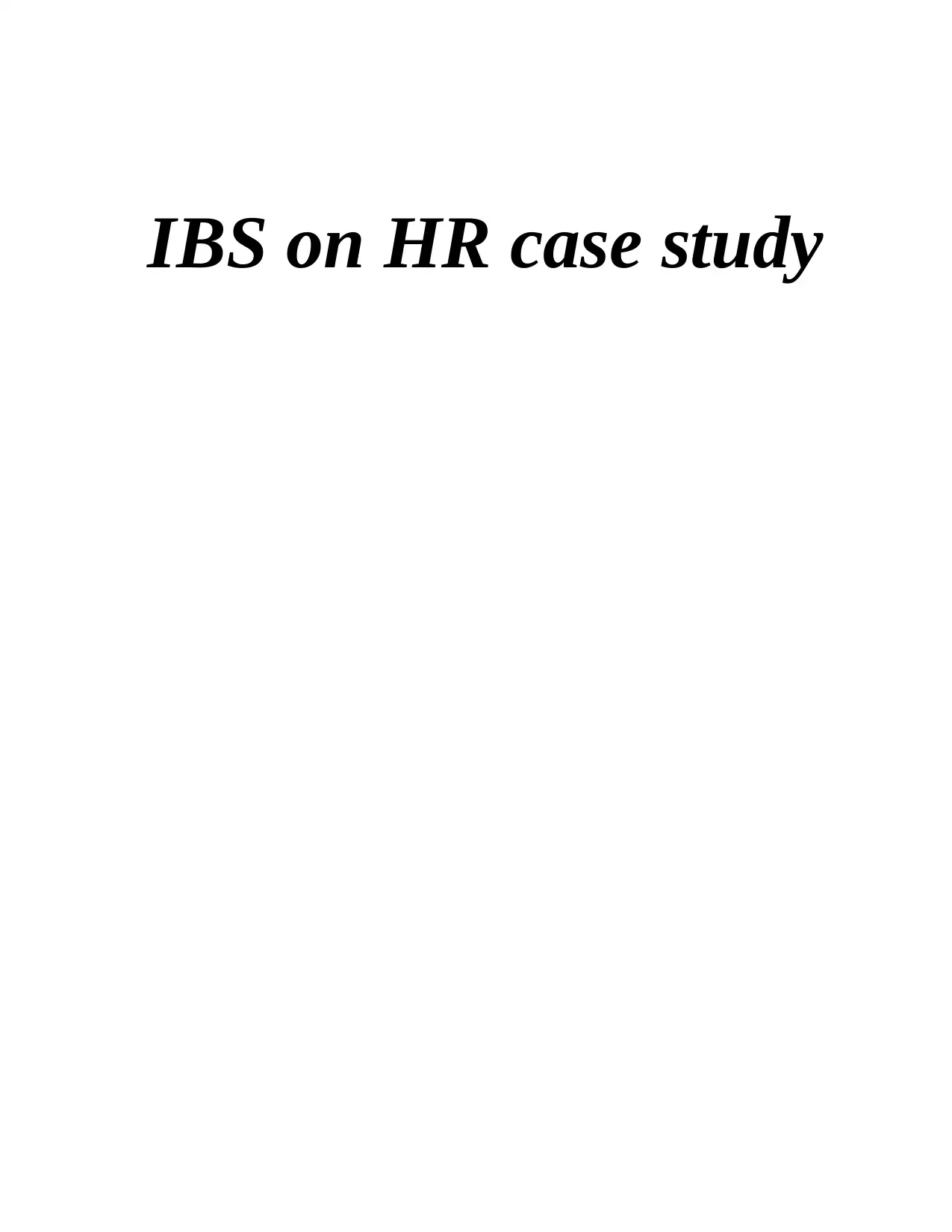
IBS on HR case study
Paraphrase This Document
Need a fresh take? Get an instant paraphrase of this document with our AI Paraphraser
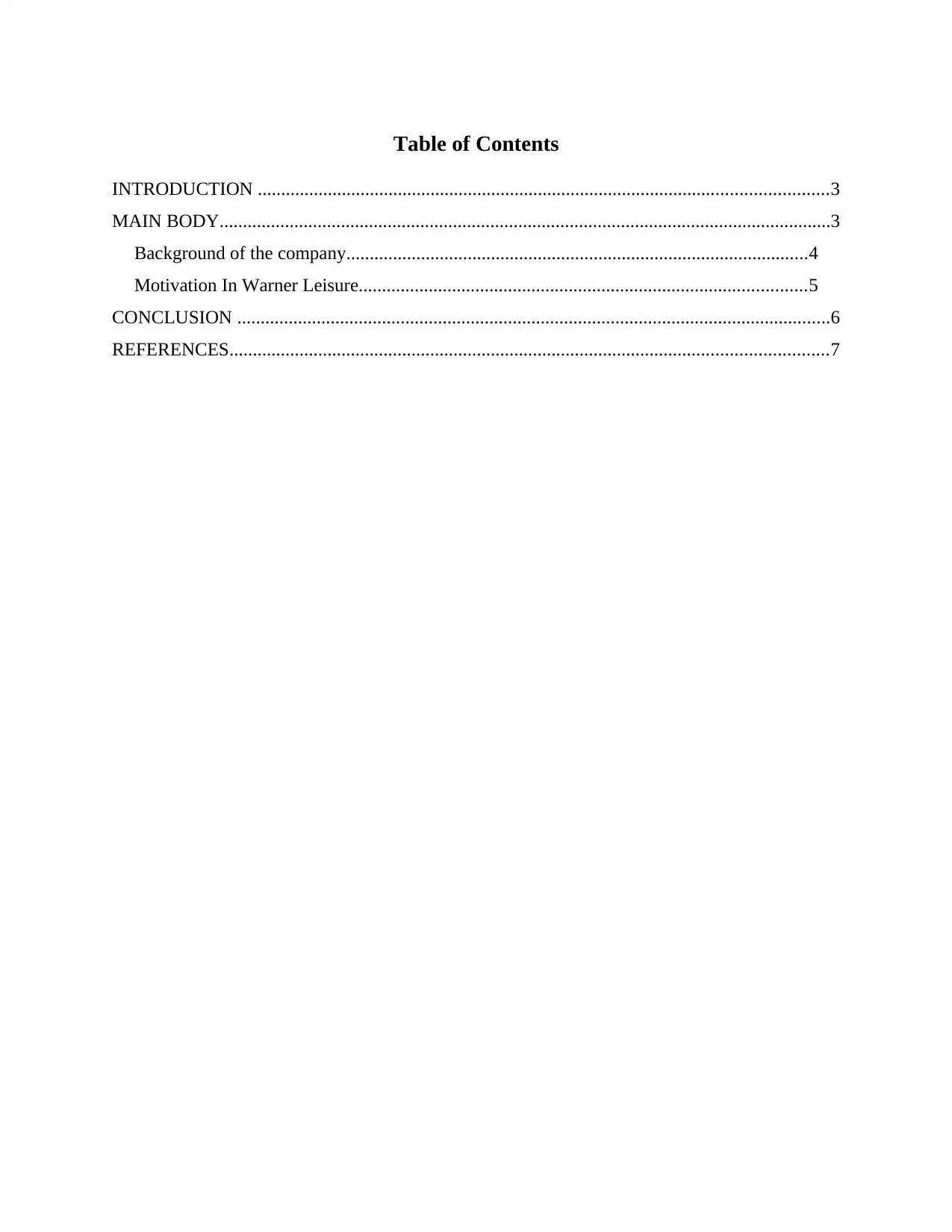
Table of Contents
INTRODUCTION ..........................................................................................................................3
MAIN BODY...................................................................................................................................3
Background of the company...................................................................................................4
Motivation In Warner Leisure................................................................................................5
CONCLUSION ...............................................................................................................................6
REFERENCES................................................................................................................................7
INTRODUCTION ..........................................................................................................................3
MAIN BODY...................................................................................................................................3
Background of the company...................................................................................................4
Motivation In Warner Leisure................................................................................................5
CONCLUSION ...............................................................................................................................6
REFERENCES................................................................................................................................7
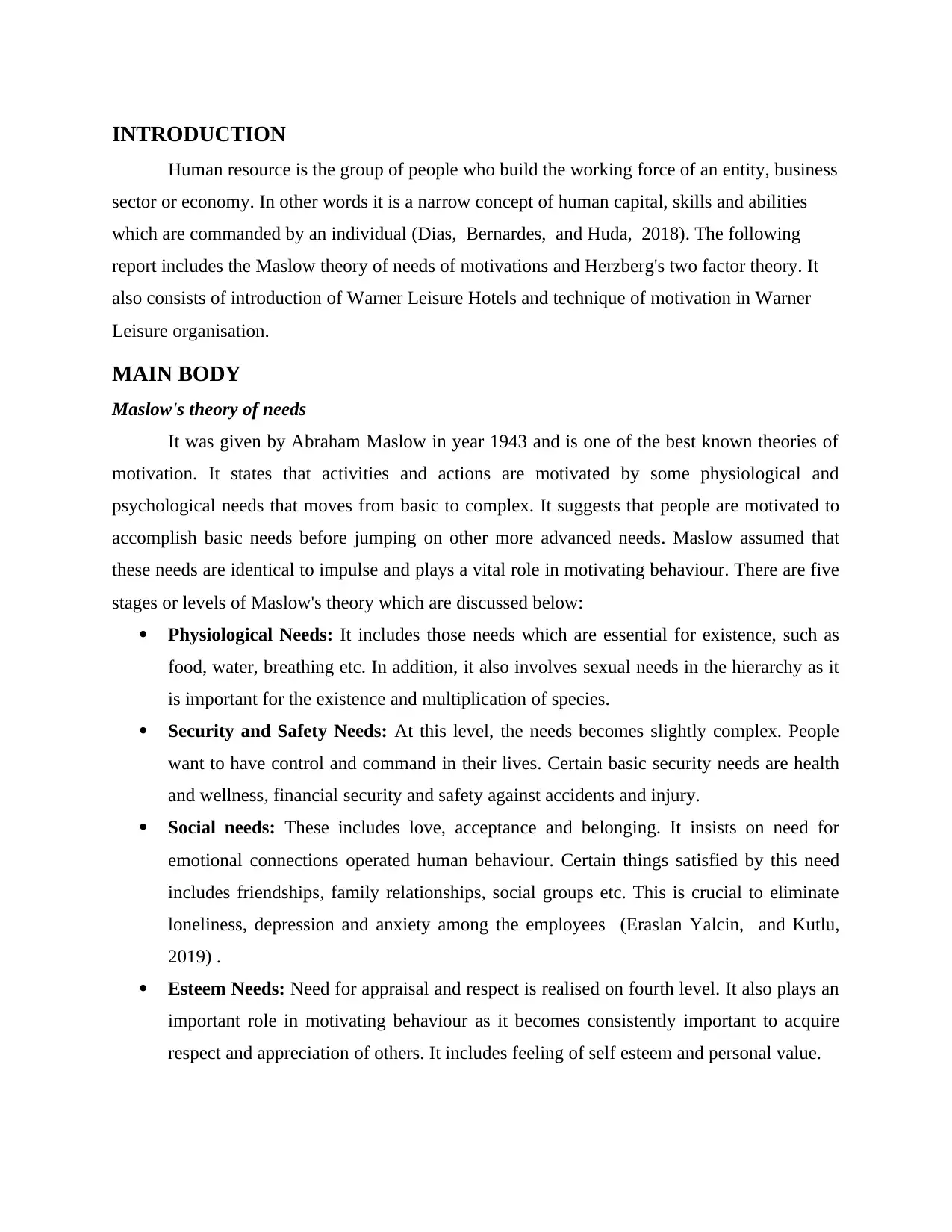
INTRODUCTION
Human resource is the group of people who build the working force of an entity, business
sector or economy. In other words it is a narrow concept of human capital, skills and abilities
which are commanded by an individual (Dias, Bernardes, and Huda, 2018). The following
report includes the Maslow theory of needs of motivations and Herzberg's two factor theory. It
also consists of introduction of Warner Leisure Hotels and technique of motivation in Warner
Leisure organisation.
MAIN BODY
Maslow's theory of needs
It was given by Abraham Maslow in year 1943 and is one of the best known theories of
motivation. It states that activities and actions are motivated by some physiological and
psychological needs that moves from basic to complex. It suggests that people are motivated to
accomplish basic needs before jumping on other more advanced needs. Maslow assumed that
these needs are identical to impulse and plays a vital role in motivating behaviour. There are five
stages or levels of Maslow's theory which are discussed below:
Physiological Needs: It includes those needs which are essential for existence, such as
food, water, breathing etc. In addition, it also involves sexual needs in the hierarchy as it
is important for the existence and multiplication of species.
Security and Safety Needs: At this level, the needs becomes slightly complex. People
want to have control and command in their lives. Certain basic security needs are health
and wellness, financial security and safety against accidents and injury.
Social needs: These includes love, acceptance and belonging. It insists on need for
emotional connections operated human behaviour. Certain things satisfied by this need
includes friendships, family relationships, social groups etc. This is crucial to eliminate
loneliness, depression and anxiety among the employees (Eraslan Yalcin, and Kutlu,
2019) .
Esteem Needs: Need for appraisal and respect is realised on fourth level. It also plays an
important role in motivating behaviour as it becomes consistently important to acquire
respect and appreciation of others. It includes feeling of self esteem and personal value.
Human resource is the group of people who build the working force of an entity, business
sector or economy. In other words it is a narrow concept of human capital, skills and abilities
which are commanded by an individual (Dias, Bernardes, and Huda, 2018). The following
report includes the Maslow theory of needs of motivations and Herzberg's two factor theory. It
also consists of introduction of Warner Leisure Hotels and technique of motivation in Warner
Leisure organisation.
MAIN BODY
Maslow's theory of needs
It was given by Abraham Maslow in year 1943 and is one of the best known theories of
motivation. It states that activities and actions are motivated by some physiological and
psychological needs that moves from basic to complex. It suggests that people are motivated to
accomplish basic needs before jumping on other more advanced needs. Maslow assumed that
these needs are identical to impulse and plays a vital role in motivating behaviour. There are five
stages or levels of Maslow's theory which are discussed below:
Physiological Needs: It includes those needs which are essential for existence, such as
food, water, breathing etc. In addition, it also involves sexual needs in the hierarchy as it
is important for the existence and multiplication of species.
Security and Safety Needs: At this level, the needs becomes slightly complex. People
want to have control and command in their lives. Certain basic security needs are health
and wellness, financial security and safety against accidents and injury.
Social needs: These includes love, acceptance and belonging. It insists on need for
emotional connections operated human behaviour. Certain things satisfied by this need
includes friendships, family relationships, social groups etc. This is crucial to eliminate
loneliness, depression and anxiety among the employees (Eraslan Yalcin, and Kutlu,
2019) .
Esteem Needs: Need for appraisal and respect is realised on fourth level. It also plays an
important role in motivating behaviour as it becomes consistently important to acquire
respect and appreciation of others. It includes feeling of self esteem and personal value.
⊘ This is a preview!⊘
Do you want full access?
Subscribe today to unlock all pages.

Trusted by 1+ million students worldwide
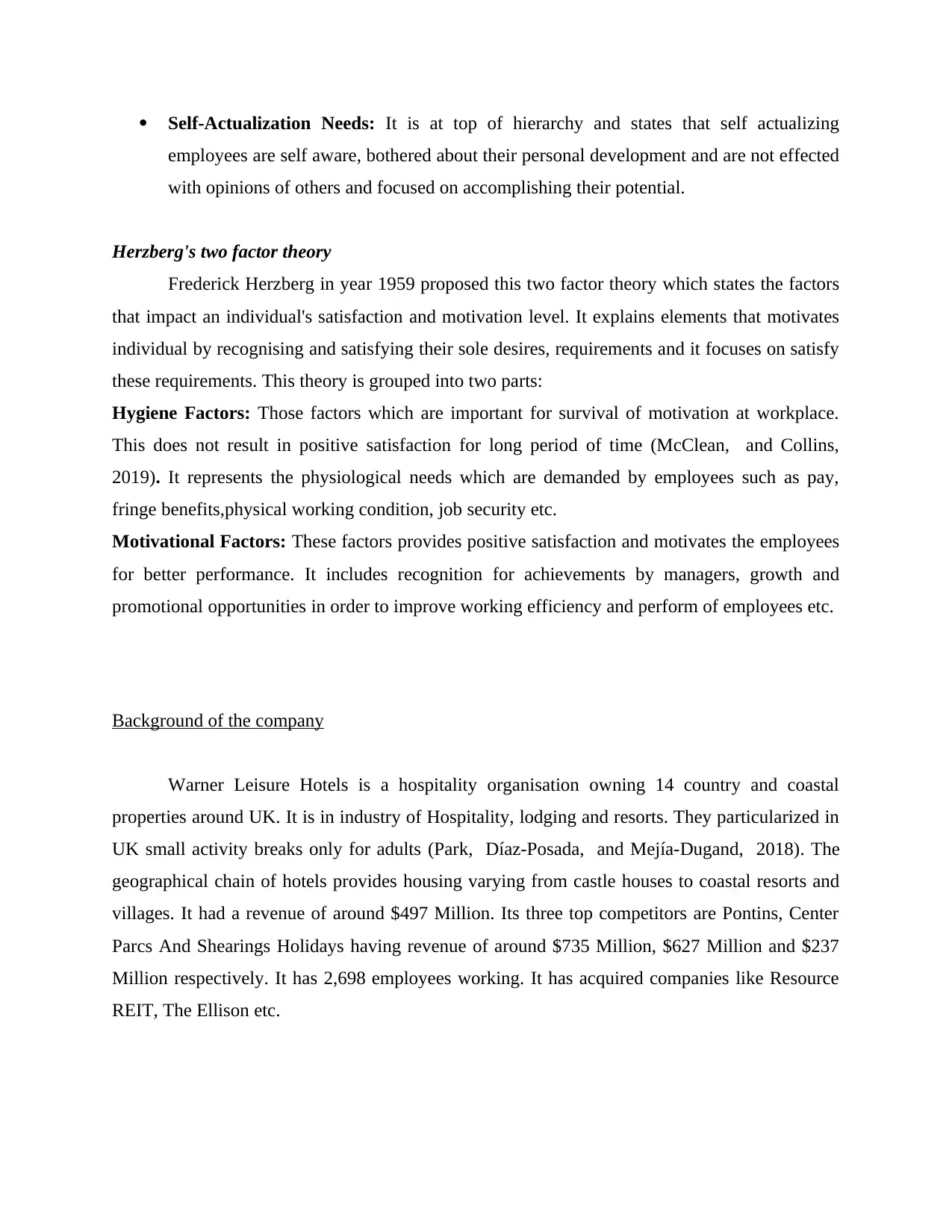
Self-Actualization Needs: It is at top of hierarchy and states that self actualizing
employees are self aware, bothered about their personal development and are not effected
with opinions of others and focused on accomplishing their potential.
Herzberg's two factor theory
Frederick Herzberg in year 1959 proposed this two factor theory which states the factors
that impact an individual's satisfaction and motivation level. It explains elements that motivates
individual by recognising and satisfying their sole desires, requirements and it focuses on satisfy
these requirements. This theory is grouped into two parts:
Hygiene Factors: Those factors which are important for survival of motivation at workplace.
This does not result in positive satisfaction for long period of time (McClean, and Collins,
2019). It represents the physiological needs which are demanded by employees such as pay,
fringe benefits,physical working condition, job security etc.
Motivational Factors: These factors provides positive satisfaction and motivates the employees
for better performance. It includes recognition for achievements by managers, growth and
promotional opportunities in order to improve working efficiency and perform of employees etc.
Background of the company
Warner Leisure Hotels is a hospitality organisation owning 14 country and coastal
properties around UK. It is in industry of Hospitality, lodging and resorts. They particularized in
UK small activity breaks only for adults (Park, Díaz-Posada, and Mejía-Dugand, 2018). The
geographical chain of hotels provides housing varying from castle houses to coastal resorts and
villages. It had a revenue of around $497 Million. Its three top competitors are Pontins, Center
Parcs And Shearings Holidays having revenue of around $735 Million, $627 Million and $237
Million respectively. It has 2,698 employees working. It has acquired companies like Resource
REIT, The Ellison etc.
employees are self aware, bothered about their personal development and are not effected
with opinions of others and focused on accomplishing their potential.
Herzberg's two factor theory
Frederick Herzberg in year 1959 proposed this two factor theory which states the factors
that impact an individual's satisfaction and motivation level. It explains elements that motivates
individual by recognising and satisfying their sole desires, requirements and it focuses on satisfy
these requirements. This theory is grouped into two parts:
Hygiene Factors: Those factors which are important for survival of motivation at workplace.
This does not result in positive satisfaction for long period of time (McClean, and Collins,
2019). It represents the physiological needs which are demanded by employees such as pay,
fringe benefits,physical working condition, job security etc.
Motivational Factors: These factors provides positive satisfaction and motivates the employees
for better performance. It includes recognition for achievements by managers, growth and
promotional opportunities in order to improve working efficiency and perform of employees etc.
Background of the company
Warner Leisure Hotels is a hospitality organisation owning 14 country and coastal
properties around UK. It is in industry of Hospitality, lodging and resorts. They particularized in
UK small activity breaks only for adults (Park, Díaz-Posada, and Mejía-Dugand, 2018). The
geographical chain of hotels provides housing varying from castle houses to coastal resorts and
villages. It had a revenue of around $497 Million. Its three top competitors are Pontins, Center
Parcs And Shearings Holidays having revenue of around $735 Million, $627 Million and $237
Million respectively. It has 2,698 employees working. It has acquired companies like Resource
REIT, The Ellison etc.
Paraphrase This Document
Need a fresh take? Get an instant paraphrase of this document with our AI Paraphraser
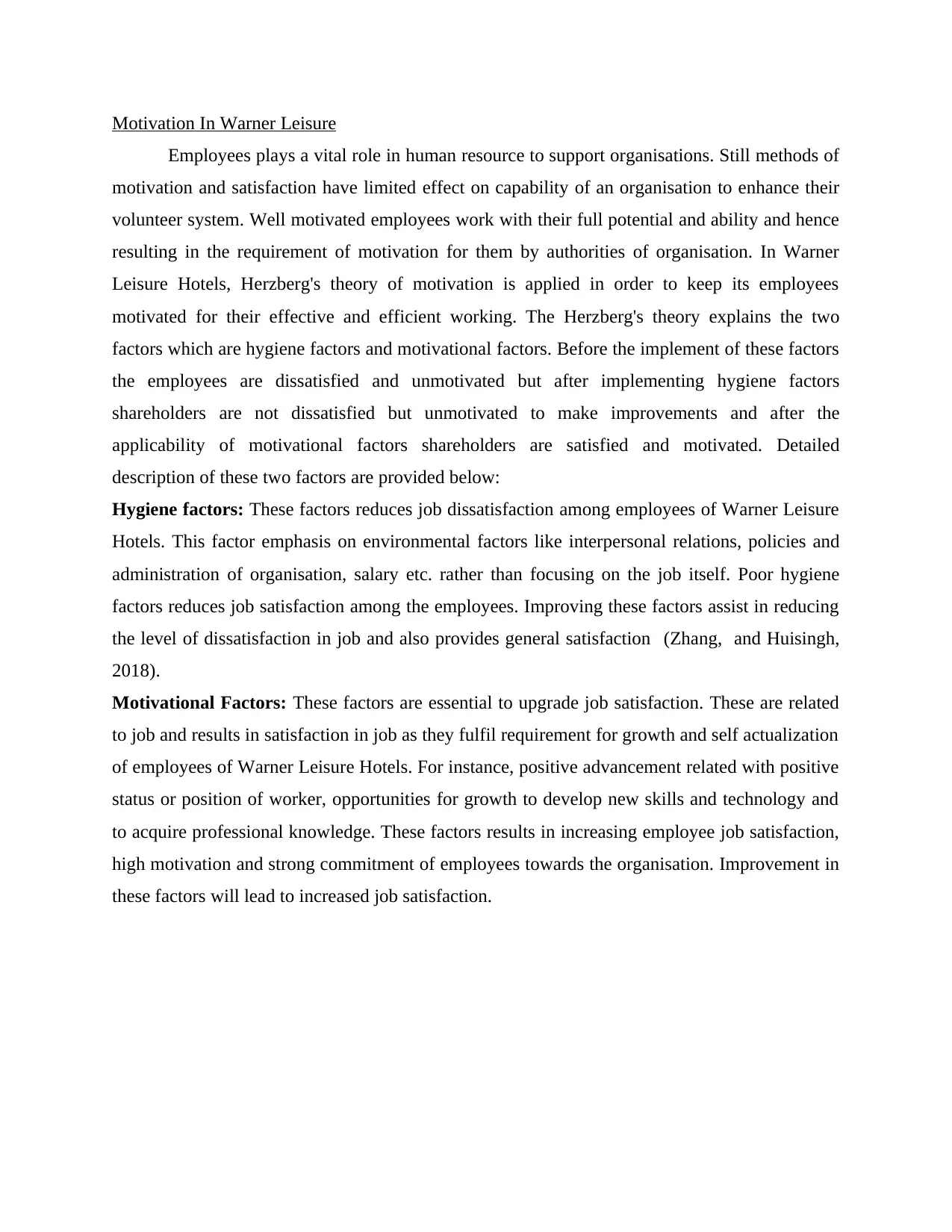
Motivation In Warner Leisure
Employees plays a vital role in human resource to support organisations. Still methods of
motivation and satisfaction have limited effect on capability of an organisation to enhance their
volunteer system. Well motivated employees work with their full potential and ability and hence
resulting in the requirement of motivation for them by authorities of organisation. In Warner
Leisure Hotels, Herzberg's theory of motivation is applied in order to keep its employees
motivated for their effective and efficient working. The Herzberg's theory explains the two
factors which are hygiene factors and motivational factors. Before the implement of these factors
the employees are dissatisfied and unmotivated but after implementing hygiene factors
shareholders are not dissatisfied but unmotivated to make improvements and after the
applicability of motivational factors shareholders are satisfied and motivated. Detailed
description of these two factors are provided below:
Hygiene factors: These factors reduces job dissatisfaction among employees of Warner Leisure
Hotels. This factor emphasis on environmental factors like interpersonal relations, policies and
administration of organisation, salary etc. rather than focusing on the job itself. Poor hygiene
factors reduces job satisfaction among the employees. Improving these factors assist in reducing
the level of dissatisfaction in job and also provides general satisfaction (Zhang, and Huisingh,
2018).
Motivational Factors: These factors are essential to upgrade job satisfaction. These are related
to job and results in satisfaction in job as they fulfil requirement for growth and self actualization
of employees of Warner Leisure Hotels. For instance, positive advancement related with positive
status or position of worker, opportunities for growth to develop new skills and technology and
to acquire professional knowledge. These factors results in increasing employee job satisfaction,
high motivation and strong commitment of employees towards the organisation. Improvement in
these factors will lead to increased job satisfaction.
Employees plays a vital role in human resource to support organisations. Still methods of
motivation and satisfaction have limited effect on capability of an organisation to enhance their
volunteer system. Well motivated employees work with their full potential and ability and hence
resulting in the requirement of motivation for them by authorities of organisation. In Warner
Leisure Hotels, Herzberg's theory of motivation is applied in order to keep its employees
motivated for their effective and efficient working. The Herzberg's theory explains the two
factors which are hygiene factors and motivational factors. Before the implement of these factors
the employees are dissatisfied and unmotivated but after implementing hygiene factors
shareholders are not dissatisfied but unmotivated to make improvements and after the
applicability of motivational factors shareholders are satisfied and motivated. Detailed
description of these two factors are provided below:
Hygiene factors: These factors reduces job dissatisfaction among employees of Warner Leisure
Hotels. This factor emphasis on environmental factors like interpersonal relations, policies and
administration of organisation, salary etc. rather than focusing on the job itself. Poor hygiene
factors reduces job satisfaction among the employees. Improving these factors assist in reducing
the level of dissatisfaction in job and also provides general satisfaction (Zhang, and Huisingh,
2018).
Motivational Factors: These factors are essential to upgrade job satisfaction. These are related
to job and results in satisfaction in job as they fulfil requirement for growth and self actualization
of employees of Warner Leisure Hotels. For instance, positive advancement related with positive
status or position of worker, opportunities for growth to develop new skills and technology and
to acquire professional knowledge. These factors results in increasing employee job satisfaction,
high motivation and strong commitment of employees towards the organisation. Improvement in
these factors will lead to increased job satisfaction.
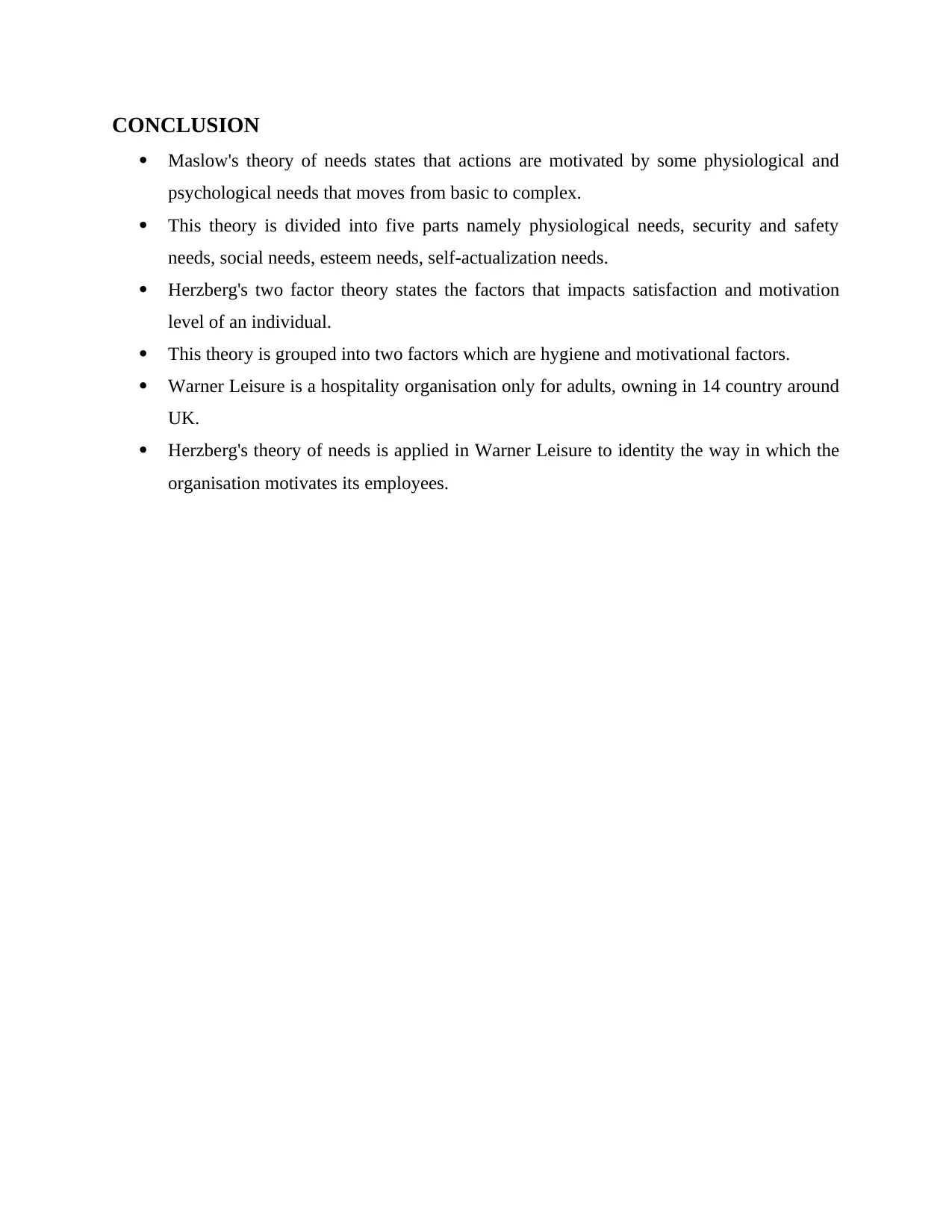
CONCLUSION
Maslow's theory of needs states that actions are motivated by some physiological and
psychological needs that moves from basic to complex.
This theory is divided into five parts namely physiological needs, security and safety
needs, social needs, esteem needs, self-actualization needs.
Herzberg's two factor theory states the factors that impacts satisfaction and motivation
level of an individual.
This theory is grouped into two factors which are hygiene and motivational factors.
Warner Leisure is a hospitality organisation only for adults, owning in 14 country around
UK.
Herzberg's theory of needs is applied in Warner Leisure to identity the way in which the
organisation motivates its employees.
Maslow's theory of needs states that actions are motivated by some physiological and
psychological needs that moves from basic to complex.
This theory is divided into five parts namely physiological needs, security and safety
needs, social needs, esteem needs, self-actualization needs.
Herzberg's two factor theory states the factors that impacts satisfaction and motivation
level of an individual.
This theory is grouped into two factors which are hygiene and motivational factors.
Warner Leisure is a hospitality organisation only for adults, owning in 14 country around
UK.
Herzberg's theory of needs is applied in Warner Leisure to identity the way in which the
organisation motivates its employees.
⊘ This is a preview!⊘
Do you want full access?
Subscribe today to unlock all pages.

Trusted by 1+ million students worldwide
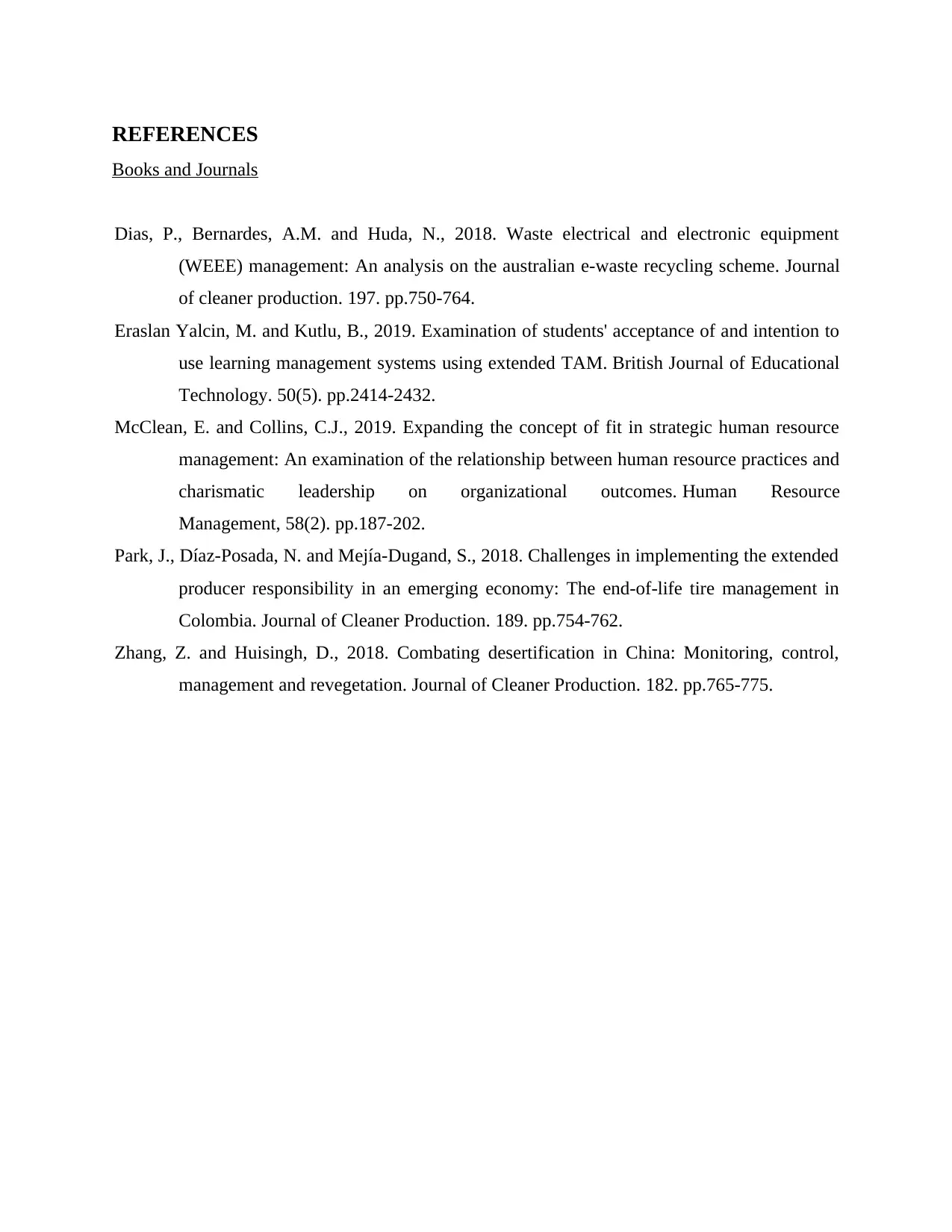
REFERENCES
Books and Journals
Dias, P., Bernardes, A.M. and Huda, N., 2018. Waste electrical and electronic equipment
(WEEE) management: An analysis on the australian e-waste recycling scheme. Journal
of cleaner production. 197. pp.750-764.
Eraslan Yalcin, M. and Kutlu, B., 2019. Examination of students' acceptance of and intention to
use learning management systems using extended TAM. British Journal of Educational
Technology. 50(5). pp.2414-2432.
McClean, E. and Collins, C.J., 2019. Expanding the concept of fit in strategic human resource
management: An examination of the relationship between human resource practices and
charismatic leadership on organizational outcomes. Human Resource
Management, 58(2). pp.187-202.
Park, J., Díaz-Posada, N. and Mejía-Dugand, S., 2018. Challenges in implementing the extended
producer responsibility in an emerging economy: The end-of-life tire management in
Colombia. Journal of Cleaner Production. 189. pp.754-762.
Zhang, Z. and Huisingh, D., 2018. Combating desertification in China: Monitoring, control,
management and revegetation. Journal of Cleaner Production. 182. pp.765-775.
Books and Journals
Dias, P., Bernardes, A.M. and Huda, N., 2018. Waste electrical and electronic equipment
(WEEE) management: An analysis on the australian e-waste recycling scheme. Journal
of cleaner production. 197. pp.750-764.
Eraslan Yalcin, M. and Kutlu, B., 2019. Examination of students' acceptance of and intention to
use learning management systems using extended TAM. British Journal of Educational
Technology. 50(5). pp.2414-2432.
McClean, E. and Collins, C.J., 2019. Expanding the concept of fit in strategic human resource
management: An examination of the relationship between human resource practices and
charismatic leadership on organizational outcomes. Human Resource
Management, 58(2). pp.187-202.
Park, J., Díaz-Posada, N. and Mejía-Dugand, S., 2018. Challenges in implementing the extended
producer responsibility in an emerging economy: The end-of-life tire management in
Colombia. Journal of Cleaner Production. 189. pp.754-762.
Zhang, Z. and Huisingh, D., 2018. Combating desertification in China: Monitoring, control,
management and revegetation. Journal of Cleaner Production. 182. pp.765-775.
1 out of 7
Related Documents
Your All-in-One AI-Powered Toolkit for Academic Success.
+13062052269
info@desklib.com
Available 24*7 on WhatsApp / Email
![[object Object]](/_next/static/media/star-bottom.7253800d.svg)
Unlock your academic potential
Copyright © 2020–2026 A2Z Services. All Rights Reserved. Developed and managed by ZUCOL.




